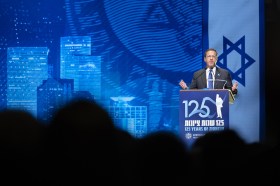
Isaac Herzog, the Israeli president.
Michael Buholzer/Keystone
“We must reclaim the term Zionism for ourselves,” the Israeli president, Isaac Herzog, declared in Basel. During events in the Swiss city last week marking the 125th anniversary of the First Zionist Congress, ideas flowed as to how this should be done. But many of them are hard to reconcile.
“We must reclaim the term Zionism for ourselves,” the Israeli president, Isaac Herzog, declared in Basel. During events in the Swiss city last week marking the 125th anniversary of the First Zionist Congress, ideas flowed as to how this should be done. But many of them are hard to reconcile.
This content was published on September 9, 2022
Benjamin von Wyl
To access the congress centre, guests first had to get past military and police forces from all across Switzerland. After that, however, Swiss German was scarcely to be heard. Over 1,000 delegates and guests, including entrepreneurs and philanthropists, had travelled to the gathering from almost all corners of the globe. In addition to Hebrew, English was the lingua franca. Two words in particular resounded from the podiums, mainly as exclamations: “Dreamer! Visionary!”
The terms sometimes referred to all the early Zionists, but mostly to Theodor Herzl. On August 29, 1897, he convened the First Zionist Congress in Basel. Herzl was the initiator and later the founding president of the World Zionist Organisation. “If you will it, it is no dream,” he wrote afterwards in reference to a Jewish state that would protect Jewish people from anti-Semitic persecution and discrimination.
On August 29, 2022, the words “If you will it, it is no dream” were omnipresent on posters and in projections. Yet the country has long been real. Next year, the State of Israel will celebrate its 75th birthday. The country has also long had to face all the ups and downs and contradictions of everyday life. However, Herzl’s dream did not end with the founding of the state.
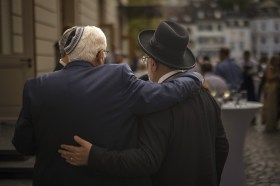
To access the congress centre, guests first had to get past military and police forces from all across Switzerland. After that, however, Swiss German was scarcely to be heard. Over 1,000 delegates and guests, including entrepreneurs and philanthropists, had travelled to the gathering from almost all corners of the globe. In addition to Hebrew, English was the lingua franca. Two words in particular resounded from the podiums, mainly as exclamations: “Dreamer! Visionary!”
The terms sometimes referred to all the early Zionists, but mostly to Theodor Herzl. On August 29, 1897, he convened the First Zionist Congress in Basel. Herzl was the initiator and later the founding president of the World Zionist Organisation. “If you will it, it is no dream,” he wrote afterwards in reference to a Jewish state that would protect Jewish people from anti-Semitic persecution and discrimination.
On August 29, 2022, the words “If you will it, it is no dream” were omnipresent on posters and in projections. Yet the country has long been real. Next year, the State of Israel will celebrate its 75th birthday. The country has also long had to face all the ups and downs and contradictions of everyday life. However, Herzl’s dream did not end with the founding of the state.

Two participants embrace during the celebrations.
Michael Buholzer/Keystone
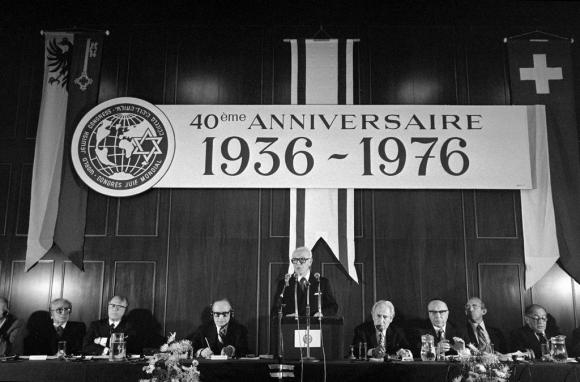
Switzerland’s delicate stances on Israel

Switzerland’s delicate stances on Israel
This content was published on May 15, 2018
Switzerland, one of the first countries to recognize the state of Israel,
is alarmed by the level of violence in Gaza Strip.
What does the Zionism of the future look like?
“Remembering the past and building a vision for the future” was the moderator’s slogan as she greeted the audience on Sunday. The two-day conference at times resembled a TED Talk event. There were accomplished speeches that combined a personal story with big ideas. But even during the panel discussions, there was no scope for questions from the audience. As a result, any potential contradictions were not discussed, at least not in the plenary. The remembrance, though, was unanimous: 2,000 years of exile that ended with the extermination of six million Jews in the Holocaust. Many speakers also shared their alarm at the rise in anti-Semitic attacks worldwide and stressed the need for decisive action.
Differences arose, however, when it came to people’s vision for the future. Thus, Yaakov Hagoel, chairperson of the World Zionist Organisation, declared that, within ten years the majority of the world’s Jews should be living in Israel – begging the question whether this was what the Jewish diaspora also wanted. Of the world’s 15 million Jews, by far the greatest number living outside Israel are in the United States. Meanwhile, in Basel, Israel’s Minister for Diaspora Affairs, Nachman Shai, placed the focus on involvement and engagement. He outlined a plan for Israel to give Jews around the world the possibility of participating politically in Israel.
“Remembering the past and building a vision for the future” was the moderator’s slogan as she greeted the audience on Sunday. The two-day conference at times resembled a TED Talk event. There were accomplished speeches that combined a personal story with big ideas. But even during the panel discussions, there was no scope for questions from the audience. As a result, any potential contradictions were not discussed, at least not in the plenary. The remembrance, though, was unanimous: 2,000 years of exile that ended with the extermination of six million Jews in the Holocaust. Many speakers also shared their alarm at the rise in anti-Semitic attacks worldwide and stressed the need for decisive action.
Differences arose, however, when it came to people’s vision for the future. Thus, Yaakov Hagoel, chairperson of the World Zionist Organisation, declared that, within ten years the majority of the world’s Jews should be living in Israel – begging the question whether this was what the Jewish diaspora also wanted. Of the world’s 15 million Jews, by far the greatest number living outside Israel are in the United States. Meanwhile, in Basel, Israel’s Minister for Diaspora Affairs, Nachman Shai, placed the focus on involvement and engagement. He outlined a plan for Israel to give Jews around the world the possibility of participating politically in Israel.
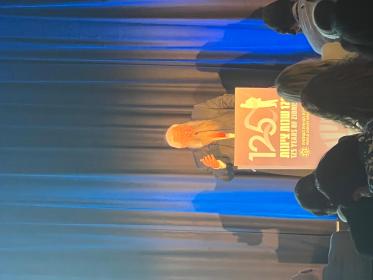
Rabbi Azman, Ukraine’s chief rabbi, spoke about
the significance of the right of Jews to immigrate to Israel. swissinfo.ch
Rabbi Azman travelled to Basel by train, as there are currently no flights from Ukraine. “For Jews who have nothing, Israel means everything,” Ukraine’s chief rabbi told the audience. For those who are now fleeing, “aliyah” – the possibility for all Jews to immigrate to Israel – is significant. Azman illustrated this with his own experience. Over 30 years ago, he and his wife left the Soviet Union, which was then collapsing. While they waited for their connecting flight in Vienna, a well-wisher gave his heavily pregnant wife a pineapple, which she had been craving.
“Aliyah” is older than political Zionism, but it is crucial to it. Zionists are convinced that political and social emancipation without a Jewish state cannot guarantee security. As best-selling Israeli author Micah Goodman said at the start of his speech: “In the 19th century, optimistic Jewish thinkers believed that the ‘Jewish question’, anti-Semitism, and discrimination would disappear through emancipation”. At the time, with the influence of the ideals of Enlightenment, many people thought that persecution had been overcome. Herzl countered this promise of emancipation with the conviction that anti-Semitic hatred in Western Europe had merely been suppressed. “So if emancipation is not the solution – what is the solution? Zionism succeeds where emancipation is doomed to fail,” said Goodman, adding that this was at the heart of Herzl’s first work, The Jewish State.
But in the future, the author continued, Israel and the Jewish diaspora should lean further on Herzl’s second influential work, The Old New Land (Altneuland). This could contain the seeds for the next generation of Zionism – a Zionism that finds “Jewish solutions to universal problems”. As examples, Goodman cited global warming and political polarisation, the latter of which he sees as the “social counterpart to global warming”. This statement aroused frenetic applause.
Rabbi Azman travelled to Basel by train, as there are currently no flights from Ukraine. “For Jews who have nothing, Israel means everything,” Ukraine’s chief rabbi told the audience. For those who are now fleeing, “aliyah” – the possibility for all Jews to immigrate to Israel – is significant. Azman illustrated this with his own experience. Over 30 years ago, he and his wife left the Soviet Union, which was then collapsing. While they waited for their connecting flight in Vienna, a well-wisher gave his heavily pregnant wife a pineapple, which she had been craving.
“Aliyah” is older than political Zionism, but it is crucial to it. Zionists are convinced that political and social emancipation without a Jewish state cannot guarantee security. As best-selling Israeli author Micah Goodman said at the start of his speech: “In the 19th century, optimistic Jewish thinkers believed that the ‘Jewish question’, anti-Semitism, and discrimination would disappear through emancipation”. At the time, with the influence of the ideals of Enlightenment, many people thought that persecution had been overcome. Herzl countered this promise of emancipation with the conviction that anti-Semitic hatred in Western Europe had merely been suppressed. “So if emancipation is not the solution – what is the solution? Zionism succeeds where emancipation is doomed to fail,” said Goodman, adding that this was at the heart of Herzl’s first work, The Jewish State.
But in the future, the author continued, Israel and the Jewish diaspora should lean further on Herzl’s second influential work, The Old New Land (Altneuland). This could contain the seeds for the next generation of Zionism – a Zionism that finds “Jewish solutions to universal problems”. As examples, Goodman cited global warming and political polarisation, the latter of which he sees as the “social counterpart to global warming”. This statement aroused frenetic applause.
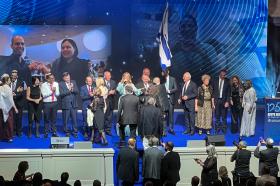
A patriotic moment to wrap up the closing gala.
The elephant in the room
Altneuland, published in 1902, tells the story of an ideal Jewish society in Palestine founded on democracy, solidarity and equality – and for Arabs too. So did Goodman broach the issue of the Middle East conflict in code? The question remains open and constantly rears its head. For as long as the occupation continues, the Zionist idea can hardly become exemplary beyond the Jewish world. The Middle East conflict was thus both absent and present throughout much of the conference.
It was the elephant in the room, but not taboo, Yves Kugelmann, editor-in-chief of the Jewish weekly magazine tachles, said in an interview. Speaking to SWI swissinfo.ch, Israeli parliamentarians Moshe Tur-Paz of the liberal ruling party, and Shirly Pinto of the right-wing ruling party openly shared their views on the subject.
Tur-Paz lives in a West Bank settlement that predates the State of Israel but that the United Nations says violates international law.
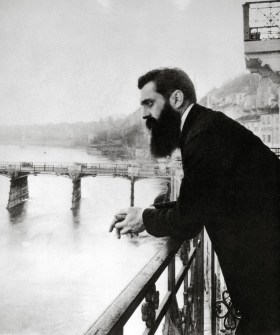
Theodor Herzl, on the balcony of the Basel hotel where
he stayed during the First Zionist Congress in 1897.
Keystone
“I believe that all of Israel was promised to my ancestors,” he said. “However, I’m not blind.” He sees the Arab population living in the area – some with Israeli passports, some without – and counts some of them as his friends. “Like most people in Israel, I long for some kind of solution that lies somewhere between autonomy and a country of their own.”
Pinto, meanwhile, stressed the need to “develop the Palestinian economy and improve the lives of Palestinians.” With regard to the Arab Israelis, the state should ensure “that they have everything that other people have,” she said.
Elections are coming up in Israel in two months’ time. Pinto and Tur-Paz are still members of the same government. Both emphasised the significance of the fact that, for the first time, an Arab-Islamic party is represented in their ruling coalition. Israel is a Jewish state, but this goes hand in hand with equal rights for all citizens.
“I believe that all of Israel was promised to my ancestors,” he said. “However, I’m not blind.” He sees the Arab population living in the area – some with Israeli passports, some without – and counts some of them as his friends. “Like most people in Israel, I long for some kind of solution that lies somewhere between autonomy and a country of their own.”
Pinto, meanwhile, stressed the need to “develop the Palestinian economy and improve the lives of Palestinians.” With regard to the Arab Israelis, the state should ensure “that they have everything that other people have,” she said.
Elections are coming up in Israel in two months’ time. Pinto and Tur-Paz are still members of the same government. Both emphasised the significance of the fact that, for the first time, an Arab-Islamic party is represented in their ruling coalition. Israel is a Jewish state, but this goes hand in hand with equal rights for all citizens.
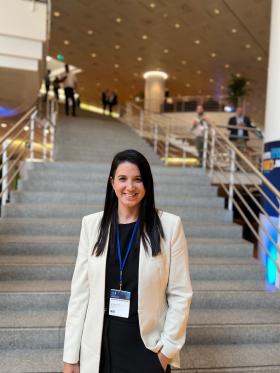
Israeli parliamentarian Shirly Pinto. swissinfo.ch
When asked about their understanding of Zionism, the words “visionary” and “dreamer” came up again. In Tur-Paz’s view, “Zionism is the story of the people of Israel – the Israeli nation – dreaming about the land of Zion and now making the best of it after 2,000 years of exile. And now, ever since the creation of the state, this means that Jews from all over the world can look to Israel.”
According to Pinto, every contribution to coexistence in Israel is a contribution to Zionism. “Be it educational work or military service – everything is part of Herzl’s vision,” she said.
The speech by former Mossad director Yossi Cohen garnered the most enthusiastic response from the audience. The Israeli secret service is an integral part of Zionism as achieved in Israel, he asserted. He then explained how the Mossad had helped to prevent an Iranian nuclear bomb from being produced.
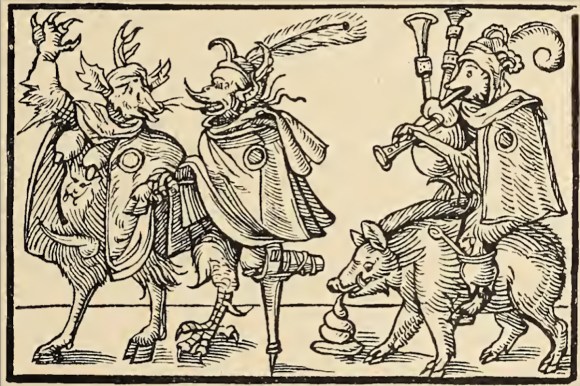
How Christian Europe created anti-Semitism in the Middle Ages
This content was published on Aug 23, 2022
When asked about their understanding of Zionism, the words “visionary” and “dreamer” came up again. In Tur-Paz’s view, “Zionism is the story of the people of Israel – the Israeli nation – dreaming about the land of Zion and now making the best of it after 2,000 years of exile. And now, ever since the creation of the state, this means that Jews from all over the world can look to Israel.”
According to Pinto, every contribution to coexistence in Israel is a contribution to Zionism. “Be it educational work or military service – everything is part of Herzl’s vision,” she said.
The speech by former Mossad director Yossi Cohen garnered the most enthusiastic response from the audience. The Israeli secret service is an integral part of Zionism as achieved in Israel, he asserted. He then explained how the Mossad had helped to prevent an Iranian nuclear bomb from being produced.

How Christian Europe created anti-Semitism in the Middle Ages
This content was published on Aug 23, 2022
The Covid pandemic has once again shown that nearly all conspiracy theories blame the Jews for the evils of the world.
Reclaiming the term Zionism
The closing gala featured a light show, special-effects fog and pop music. At this point, the interpretation of Herzl’s work took on some perplexing features. For example, he was compared to the CEO of a start-up who used crowdfunding to help Israel succeed.
The Swiss speakers at the gala were Beat Jans, president of the Basel city government and Economics Minister Guy Parmelin. They both addressed the Middle East conflict. Parmelin sparked spontaneous applause when he spoke in favour of a two-state solution.
The Israeli president, Isaac Herzog, also talked about Herzl, the pioneer of Zionism, who turned “Jewish identity into an effective political doctrine”. One year earlier, he explained, a “leading social media platform” had discussed whether the word Zionism should be treated as an insult, as it was being misused as anti-Semitic code. At the gala evening in Basel, Herzog declared: “We must reclaim the term Zionism for ourselves” – that is, regain the sovereignty of interpretation and translate it positively.
The entire anniversary event was infused with a great commitment to understanding Zionism in an idealistic, even utopian light. But just how the ideal society of Herzl’s Altneuland can be transformed into realpolitik remains to be seen. Unlike Herzl the dreamer, today’s Zionists are not starting with a clean slate.
Edited by Balz Rigendinger; translated from German by Julia Bassam/gw
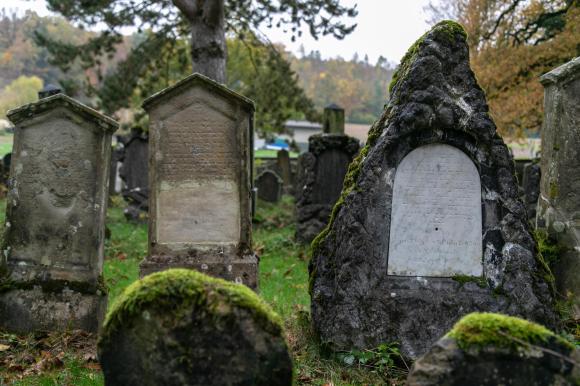
An anti-Jewish revolt in an enlightened country
This content was published on Aug 30, 2022
For centuries, Jewish life in what is now Switzerland was marked by discrimination.
No comments:
Post a Comment